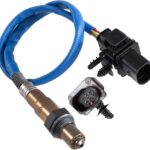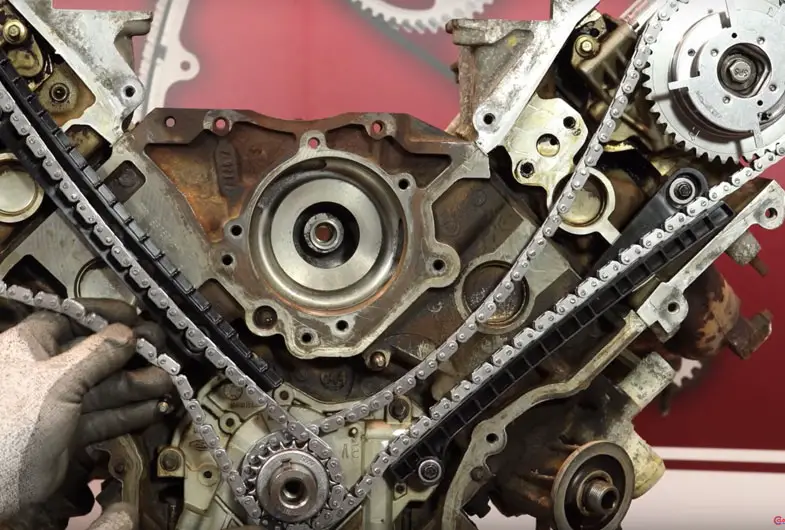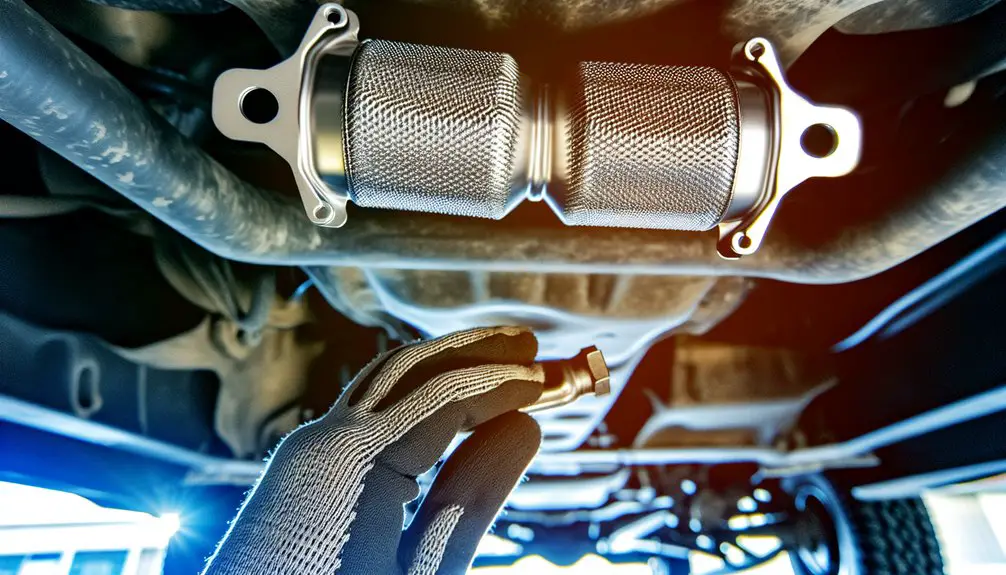When you notice your Ford F150 acting strangely, it might be a sign of PCM failure. You could experience stalling, trouble starting, or even a check engine light that won't go away. If your truck's fuel economy suddenly drops and you feel rough idling, those symptoms can't be ignored. Unusual transmission behavior, like slipping gears or harsh shifting, might also surface, hinting at deeper issues. Understanding these signs is essential, but what do you do next to address them?
Key Takeaways
- Erratic engine behavior, such as stalling and difficulty starting, may indicate PCM failure in a Ford F150.
- Frequent misfires and triggered check engine light suggest potential issues with the PCM's fuel management.
- Sudden drops in fuel economy can signal PCM-related problems affecting air-fuel mixture regulation.
- Unusual transmission behavior, including harsh shifting or slipping, often points to PCM malfunctions.
- Dashboard warning lights, especially multiple indicators, may reflect broader PCM communication issues needing immediate attention.
Understanding PCM Functions
Understanding the functions of the Powertrain Control Module (PCM) is vital for diagnosing potential issues in your Ford F150. The PCM acts as the brain of your vehicle's engine and transmission systems, coordinating various functions to enhance performance and fuel efficiency. It continuously monitors data from multiple sensors, including those for the throttle position, oxygen levels, and engine temperature, ensuring proper operation.
When you perform PCM diagnostics, you're fundamentally checking the health of this important component. You can use specialized diagnostic tools to read fault codes and assess the performance of the PCM. These diagnostics help identify any anomalies in the communication between the PCM and other modules, which can prevent cascading issues in your vehicle.
Additionally, staying up to date with PCM updates is essential. Manufacturers often release updates that enhance performance, improve fuel efficiency, or fix known issues. Regularly checking for these updates can greatly affect your truck's reliability and efficiency.
Common Symptoms of PCM Failure
PCM failure can manifest through a variety of symptoms that directly impact your Ford F150's performance and drivability. One of the first signs you might notice is erratic engine behavior, such as stalling or difficulty starting. You may also experience frequent misfires, which can trigger the check engine light.
If your vehicle's fuel economy suddenly declines, this could indicate an issue with the PCM's fuel management functions.
Another common symptom is unresponsive or malfunctioning electrical components, particularly when it comes to the dashboard gauges and warning lights. Additionally, you might notice unusual transmission behavior, like harsh shifting or slipping. These symptoms often indicate that the PCM isn't effectively communicating with other vehicle systems.
To address these issues, employing effective troubleshooting techniques is essential. Start by running a diagnostic scan to retrieve any trouble codes. If the PCM is confirmed as the culprit, consider a PCM replacement.
Always verify that the replacement unit is compatible with your vehicle specifications to avoid further complications. Remember, early detection can save you from more extensive repairs down the line.
Engine Performance Issues
Engine performance issues often stem from a malfunctioning PCM, leading to a cascade of problems that can greatly hinder your Ford F150's capabilities.
When the PCM isn't operating correctly, you might experience engine misfires, which occur when the combustion process is disrupted. This misfiring not only causes rough idling but can also result in a significant loss of power during acceleration.
In addition to misfires, you may notice a decline in fuel efficiency. A malfunctioning PCM fails to accurately manage the air-fuel mixture, leading to either a lean or rich condition.
A lean condition often results in poor acceleration and engine stalling, while a rich condition can lead to excessive fuel consumption and increased emissions. This imbalance can make your driving experience frustrating and costly at the pump.
Moreover, the PCM's inability to communicate effectively with other engine components can trigger warning lights on your dashboard, indicating further underlying issues.
If you observe these symptoms, it's essential to address the PCM's functionality immediately to restore ideal engine performance and improve your F150's overall efficiency.
Transmission Problems
If you're experiencing erratic shifting behavior in your Ford F150, it could indicate PCM-related transmission issues.
You might also notice slipping gears or delayed engagement when changing speeds, which can further complicate your driving experience.
Addressing these symptoms promptly is essential to prevent more severe transmission damage.
Erratic Shifting Behavior
Erratic shifting behavior in your Ford F150 can be a frustrating experience, often stemming from issues within the transmission system. When your vehicle exhibits unpredictable shifting patterns, it may indicate a malfunction in the transmission control module (TCM) or other related components. The TCM is responsible for managing the shifting process, and if it's not functioning properly, you might notice sudden upshifts or downshifts that feel harsh or delayed.
Several factors can contribute to erratic shifting, including low transmission fluid levels, contaminated fluid, or a faulty throttle position sensor. If the TCM receives incorrect data from these components, it struggles to execute smooth gear changes.
Additionally, wiring issues or corroded connectors can disrupt the signals sent to the TCM, exacerbating the problem.
To address erratic shifting behavior, it's essential to diagnose the underlying cause accurately. Regular maintenance, such as fluid changes and inspections, can help prevent these issues from escalating.
If you're experiencing these symptoms, consider consulting a qualified technician who can assess your transmission control system and restore proper functionality. Ignoring these signs may lead to more severe transmission problems down the line.
Slipping Gears Issues
When experiencing erratic shifting behavior, you might also notice slipping gears, another common symptom of transmission problems in the Ford F150.
Slipping gears occur when the transmission fails to maintain the proper gear ratio, causing the engine to rev without a corresponding increase in vehicle speed. This can lead to a frustrating driving experience and potential safety hazards.
One primary cause of slipping gears is low or contaminated transmission fluid. The transmission fluid plays an essential role in lubricating components and enabling smooth gear shifts. If the fluid is dirty or below the recommended level, it can result in insufficient hydraulic pressure, leading to gear slippage.
Regularly checking and changing your transmission fluid can help mitigate this issue.
Additionally, worn or damaged internal components, such as clutches or bands, can also contribute to slipping gears. These components are important for maintaining the gear ratio and guaranteeing effective power transfer from the engine to the wheels.
If you suspect slipping gears, it's important to address the problem promptly to avoid further damage to your transmission and guarantee safe operation of your Ford F150.
Delayed Engagement Symptoms
One of the troubling signs you might encounter with your Ford F150 is delayed engagement, where there's a noticeable lag between shifting the transmission into gear and the vehicle actually moving. This symptom can be frustrating and may indicate underlying transmission problems that require immediate attention.
Delayed engagement often occurs due to issues with the vehicle's transmission fluid, such as low levels or contamination. If the fluid isn't circulating properly, it can diminish transmission responsiveness, leading to the lag you experience.
Additionally, worn or damaged transmission components, like the valve body or clutch plates, may also contribute to this issue.
You might notice this symptom most prominently when shifting from park to drive or reverse. If you find yourself waiting longer than usual for the vehicle to respond, it's essential to address it promptly. Ignoring delayed engagement can lead to further transmission damage, resulting in more costly repairs down the line.
Regular maintenance checks, including fluid changes and inspections, can help prevent these problems. If you experience delayed engagement, consider consulting a professional to diagnose and resolve the issue effectively. Your F150 deserves peak performance.
Warning Lights on Dashboard
When you notice warning lights on your Ford F150's dashboard, it's essential to address them promptly.
The Check Engine Light may indicate PCM issues affecting performance, while the ABS Warning Indicator suggests potential braking system malfunctions.
Additionally, a Battery Light Alert can signal electrical problems that could lead to further complications if not resolved quickly.
Check Engine Light
The illumination of the check engine light on your Ford F150's dashboard serves as a critical indicator of potential PCM (Powertrain Control Module) issues. When this light activates, it signals that the engine's computer has detected a malfunction within the powertrain system. The check engine light can illuminate due to various light causes, ranging from minor issues to significant problems.
Common light causes include faulty oxygen sensors, which can affect fuel efficiency and emissions, or a loose gas cap, which can lead to fuel vapor leaks. Additionally, a malfunctioning mass airflow sensor can disrupt air-fuel mixture balance, impacting engine performance.
If you notice the check engine light on, it's important to use an OBD-II scanner to retrieve diagnostic trouble codes, which provide more specific information on the underlying issue. Ignoring the check engine light can lead to more severe damage and costly repairs.
Regular maintenance and prompt attention to this warning can help guarantee your F150 continues to operate efficiently. Don't delay in addressing any check engine light activation; diagnosing the problem early can save you time and money in the long run.
ABS Warning Indicator
A persistent ABS warning indicator on your Ford F150's dashboard can signify issues with the Anti-lock Braking System. This system is vital for maintaining vehicle control during emergency braking situations, preventing wheel lock-up.
When the ABS warning light illuminates, it typically indicates a malfunction in the ABS system, which may stem from various sources, including faulty sensors, wiring issues, or a defective ABS control module.
You should first examine the brake fluid level, as low fluid can trigger the ABS warning indicator. If the fluid is fine, you'll want to use an OBD-II scanner to check for any diagnostic trouble codes (DTCs). These codes can provide insight into specific malfunctions within the ABS system.
Common issues might involve wheel speed sensors that are dirty or damaged, which can affect the system's ability to monitor wheel rotation accurately.
Ignoring the ABS warning indicators can lead to compromised braking performance, increasing your risk of accidents.
It's important to address the issue promptly by consulting a qualified mechanic who can diagnose and repair the ABS system effectively, ensuring your Ford F150 operates safely.
Battery Light Alert
Experiencing a battery light alert on your Ford F150's dashboard can indicate underlying electrical issues that may affect overall vehicle performance. This warning light typically signals problems related to battery maintenance, such as low voltage or a failing alternator. When the battery light illuminates, it's vital to address the situation promptly to prevent further complications.
First, check the battery connections for corrosion or looseness, as these can lead to voltage fluctuations. A weak or dead battery is a common culprit, and it's important to verify your battery is adequately charged.
If the battery is in good condition, consider testing the alternator, which is responsible for charging the battery while the engine runs. A malfunctioning alternator may not provide enough voltage, resulting in the battery light alert.
If you continue to experience the warning light despite performing these checks, it may indicate a more significant issue within the PCM (Powertrain Control Module) or electrical system. Ignoring this alert can lead to diminished performance, so be certain you address any concerns immediately to maintain your vehicle's reliability and longevity.
Electrical System Malfunctions
Electrical system malfunctions in the Ford F150 can manifest in various ways, often signaling an underlying PCM (powertrain control module) issue.
One common symptom you might experience is unexpected battery drain. If you notice your battery frequently discharging or having difficulty starting, it could indicate that the PCM isn't efficiently managing the electrical load or that it's failing to communicate properly with other components.
Another issue to watch for is erratic behavior of electrical accessories, like the lights flickering or the radio cutting in and out. These anomalies often stem from wiring issues that may be exacerbated by a malfunctioning PCM. Corroded or damaged wiring can cause inconsistent signals, leading to further complications in the electrical system.
You should also pay attention to the dashboard warning lights. If multiple indicators light up simultaneously without an apparent reason, it may point to a PCM problem affecting the electrical communication within the vehicle.
Addressing these electrical malfunctions promptly is essential, as they can lead to more significant issues if left unresolved. Regular inspections can help catch these problems before they escalate into costly repairs.
Diagnostic Trouble Codes
Diagnosing issues in your Ford F150 often involves interpreting diagnostic trouble codes (DTCs) generated by the PCM.
These codes act as a communication link between your vehicle's onboard computer and you, providing essential information about potential malfunctions. To read these codes, you'll need appropriate diagnostic tools, such as an OBD-II scanner, which connects to your vehicle's diagnostic port.
Once you retrieve the DTCs, you'll encounter a combination of letters and numbers, each corresponding to a specific issue. For example, a code like P0301 indicates a misfire in cylinder one.
It's important to refer to trouble code explanations provided in service manuals or online databases to understand the implications of each code fully. This understanding will help you narrow down potential problems and decide on the necessary repairs.
When to Seek Professional Help
At some point, you might notice symptoms indicating a potential PCM failure, such as erratic engine performance or unexpected warning lights. If you encounter these issues, it's essential to recognize the right moment to seek professional help. Ignoring these signs can lead to more severe problems, including reduced fuel efficiency, stalling, or even engine damage.
Before the situation escalates, consider conducting preventive maintenance. Regular checks can help identify underlying issues before they compromise your PCM. If basic troubleshooting fails—like resetting the PCM or checking fuses—you should definitely look for professional diagnostics.
Professional diagnostics involve specialized equipment that can read diagnostic trouble codes (DTCs) and analyze data streams from your vehicle's systems. Technicians can pinpoint whether the PCM itself is malfunctioning or if another component is at fault.
They've the expertise to differentiate between various potential issues, ensuring you don't waste time or money on unnecessary repairs.
Frequently Asked Questions
Can PCM Failure Cause Fuel Efficiency Issues?
Yes, PCM failure can negatively impact fuel economy by disrupting engine performance. When the PCM malfunctions, it may mismanage fuel delivery and timing, leading to inefficient combustion and decreased efficiency, ultimately harming your vehicle's overall performance.
How Long Does a PCM Last in a Ford F150?
A PCM's lifespan typically ranges from 10 to 15 years, depending on driving conditions and maintenance. Regular PCM maintenance, like software updates and inspections, can extend its life and enhance your vehicle's performance.
Is PCM Failure More Common in Specific F150 Model Years?
Yes, PCM failure can be more common in specific model years. When you analyze model comparisons, you'll notice certain years exhibiting common symptoms like erratic shifting, poor fuel economy, and unexpected engine performance issues.
Can I Replace the PCM Myself?
Yes, you can perform a DIY replacement of the PCM. Make certain you follow proper PCM troubleshooting steps, including disconnecting the battery, removing the old unit, and programming the new one to your vehicle's specifications.
What Are the Costs Associated With PCM Replacement?
PCM replacement typically involves repair costs ranging from $200 to $1,200, depending on your vehicle's make and model. You'll also need to factor in labor charges if you're not doing the installation yourself.
Conclusion
In conclusion, if you're experiencing erratic engine behavior, misfires, or unusual transmission issues in your Ford F150, it's essential to take into account PCM failure as a potential cause. Ignoring these symptoms can lead to more severe problems and costly repairs down the line. Always pay attention to warning lights and diagnostic trouble codes. If you suspect PCM failure, don't hesitate to seek professional help to guarantee your vehicle runs smoothly and efficiently.
- Ford F150 Shaking When Idling - December 23, 2024
- Ford F150 Timing Chain Replacement - December 23, 2024
- How Many Catalytic Converters Are In A Ford F150 - December 23, 2024






